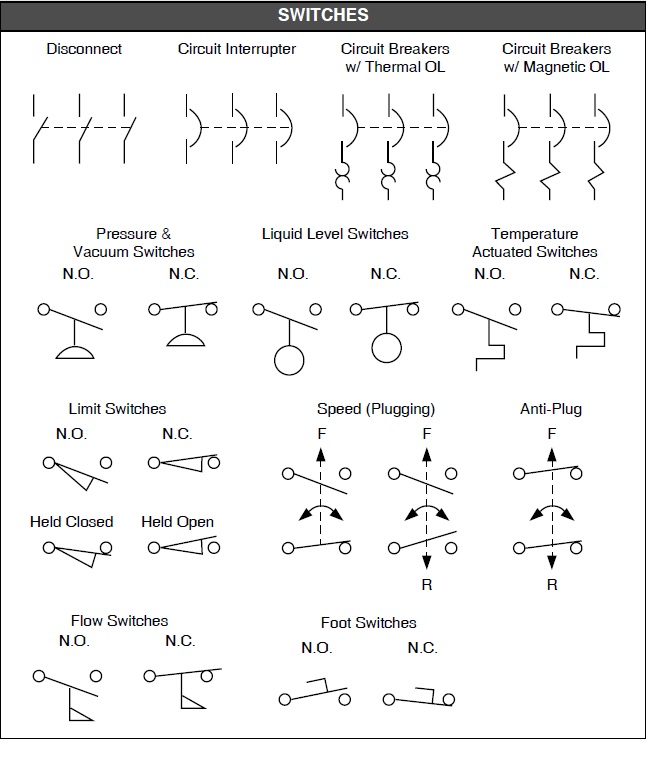Decoding IEC Switch Symbols: A Practical Guide
Ever stared at a switch on an electronic device and wondered what those cryptic symbols actually mean? You're not alone. Those aren't just random squiggles; they're IEC (International Electrotechnical Commission) standardized symbols, a universal language for power control. Knowing how to interpret these symbols is crucial for safely and effectively operating a wide range of electrical and electronic equipment.
Understanding IEC switch symbols is like having a secret decoder ring for your gadgets. It empowers you to confidently operate equipment, troubleshoot issues, and even choose the right replacement switch if necessary. This guide will walk you through everything you need to know about recognizing these symbols, from simple on/off switches to more complex functions.
The IEC developed these standardized symbols to ensure clear communication across different languages and technical backgrounds. Imagine the chaos if every manufacturer used their own unique symbols! This standardization ensures that anyone, anywhere in the world, can understand the basic functions of a switch just by looking at its symbol. This is particularly important in industrial settings where misinterpreting a switch function could have serious consequences.
One of the primary challenges in recognizing IEC switch symbols lies in their variety and sometimes abstract nature. While some symbols are intuitive, others can be quite complex, representing functions like momentary operation, multiple poles, or different switching actions. This can be daunting for those unfamiliar with the standard. That's where this guide comes in handy, providing clear explanations and examples to help you decipher even the most cryptic symbols.
This guide will equip you with the knowledge to confidently navigate the world of IEC switch symbols. We'll cover the basics, delve into more complex symbols, and provide practical tips to help you quickly identify and understand the function of any switch you encounter. Whether you're a seasoned electrician or a curious DIY enthusiast, understanding these symbols is an essential skill for anyone working with electronic equipment.
The origin of IEC switch symbols dates back to the need for international standardization in electrical engineering. The IEC, founded in 1906, has been instrumental in establishing global standards for various electrical and electronic components, including switches. These standardized symbols help prevent miscommunication and ensure safety across different industries and regions.
A simple example of an IEC switch symbol is the circle with a line through it, representing the "off" state. A circle with a single line extending from it represents the "on" state. These simple yet effective symbols instantly convey the switch's primary function.
One benefit of recognizing IEC switch symbols is enhanced safety. By correctly interpreting a switch's function, you can avoid accidentally activating the wrong function or causing damage to equipment. For example, knowing the difference between a momentary switch and a latching switch can prevent unintended operation of machinery.
Another benefit is simplified troubleshooting. If a piece of equipment isn't functioning correctly, understanding the switch symbols can help pinpoint the source of the problem. For instance, recognizing a symbol indicating a two-pole switch can help you diagnose whether both poles are functioning as expected.
Lastly, knowing these symbols helps in selecting the right replacement switch. If a switch fails, you can easily identify the correct replacement by matching the symbol on the old switch with the symbol on the new one. This saves time and ensures compatibility with your equipment.
Start by familiarizing yourself with the basic IEC switch symbols for on/off, momentary operation, and different pole configurations. Then, consult resources like online databases and IEC publications for more complex symbols. Practice identifying symbols on various devices to reinforce your learning.
Advantages and Disadvantages of Understanding IEC Switch Symbols
| Advantages | Disadvantages |
|---|---|
| Enhanced Safety | Initial learning curve |
| Simplified Troubleshooting | Complexity of some symbols |
| Easy Replacement of Switches |
Best Practices:
1. Consult the IEC standard documentation.
2. Use online symbol databases.
3. Practice identifying symbols on different devices.
4. Refer to equipment manuals for specific symbol interpretations.
5. Seek expert advice when encountering unfamiliar symbols.
FAQ:
1. What does IEC stand for? International Electrotechnical Commission.
2. Where can I find a comprehensive list of IEC switch symbols? Online databases and IEC publications.
3. What does a circle with a line through it mean? Off state.
4. What does a circle with a line extending from it symbolize? On state.
5. What is the significance of standardized switch symbols? Ensures clear communication and safety.
6. How can I learn to identify complex IEC switch symbols? Practice and consult resources.
7. Are there any apps for identifying IEC symbols? Yes, some apps offer symbol libraries and identification tools.
8. Why is it important to understand these symbols? For safe and effective equipment operation.
In conclusion, understanding IEC switch symbols is not just a technical skill, but a crucial element of ensuring safety and efficiency when working with electronic equipment. From the simple on/off switch to more complex configurations, recognizing these symbols empowers you to confidently operate devices, troubleshoot issues, and select the correct replacement components. While the initial learning curve might seem daunting, the benefits of mastering this universal language of power control are undeniable. By taking the time to familiarize yourself with these symbols, you are investing in your safety and improving your ability to interact with the technology that surrounds us. So, dive in, explore the world of IEC switch symbols, and empower yourself with the knowledge to navigate the electrical landscape with confidence.
Super lemon cherry strain
Navigating dmv requirements for senior drivers over 70
Water on wood floors a quick guide to damage control













